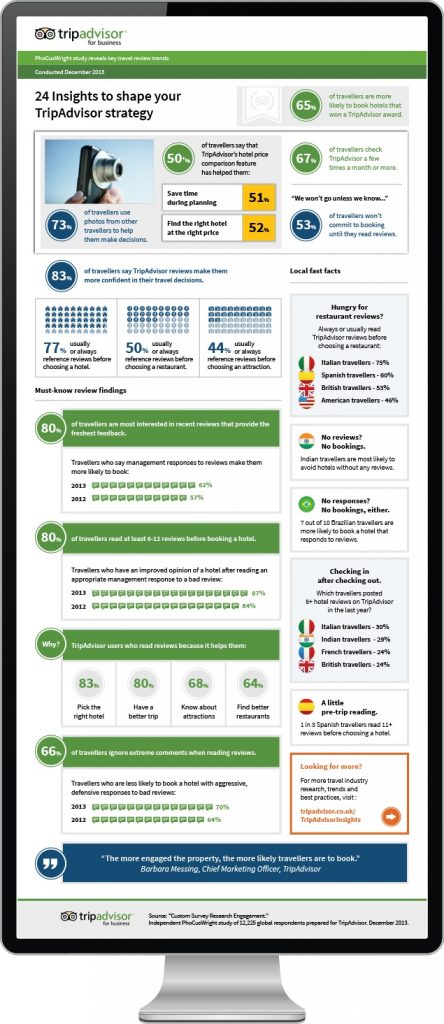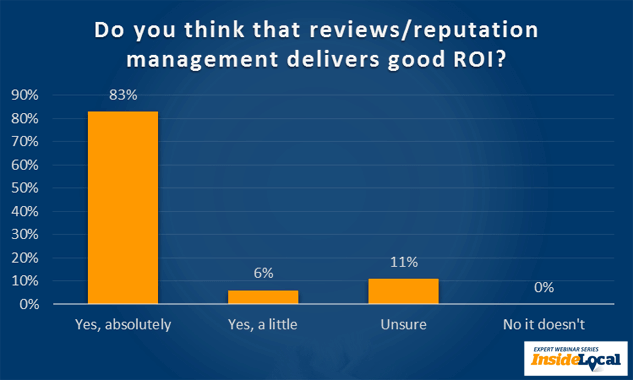When searching for a hotel, visitors generally start their search at an OTA (Online Travel Agency). These sites provide a comprehensive list of hotels per geographic region and enable customers to narrow down their searches by price, amenities or proximity. OTAs present visitor reviews for the hotels as well.
Most visitors will generally check the hotels they are considering on an OTA site like TripAdvisor, the leading global travel site, boasting close to 400 million reviews. In fact, TripAdvisor found that 77% of all travelers always or usually checked reviews before completing a booking, among other interesting statistics.

Source: TripAdvisor
Clearly, the types of reviews a hotel receives, and the manner in which hotel management responds to these reviews are a key factor in the decision-making process of potential guests. Social media’s impact on hotel bookings is significant. Correct management of this critical marketing platform will ultimately affect the volume of hotel bookings, whether via OTA or direct.
How can hotels harness the power of review sites to their benefit? Below are some simple tactics, which should be included in any hotel’s online marketing strategy:
1. Institute a review management strategy
Reputation and review management is quickly becoming a key role in online marketing. In fact, 83% of online marketing executives believe that online review management delivers a very good return on investment.

Source: Search Engine Land
Put someone in charge of your social media, be it reviewing and updating your Facebook page, responding to posted messages, or scouting online review pages. This will not place too much of a burden on your online marketing budget, but can be extremely important in how you are perceived by potential guests.
2. Encourage your guests to write reviews
According to a PhoCusWright study, 53% of respondents claimed they would not book a hotel that did not have reviews.
The more reviews a hotel has, the more popular it becomes. When a potential guest goes onto to TripAdvisor or a social media site to research a hotel and sees just a few reviews, this is a red flag. ‘If no one else has gone there, why would I consider it?’ is what they will likely think.
Urge your visitors to leave a review by placing a card in the rooms found on the table or nightstand. You can include a reminder with a link to TripAdivsor or your Facebook page on your WiFi sign in page. Finally, remember to send an email reminder to guests after their stay encouraging them to review their experience
3. Check the validity of your reviews
Not surprisingly, 20% of online reviews are fake. These include both amplified positive reviews and scathingly worded complaints. Obviously, a fake review created by you can be very harmful to your image. There are currently online tools, which check review validity as well as articles explaining how to recognize a fake review. Fake reviews use overly positive marketing language and often have little or no details of the trip itself. Multiple reviews of a hotel in a short period of time is also considered a dead giveaway.
In other words, do not be tempted to write a fake review about your hotel or a competitor’s – in the long term, this will only hurt you. Today’s savvy traveler reads 6-12 hotel reviews before booking. 64% of travelers will ignore extreme comments, so make sure your reviews are authentic and believable.
Be sure to evaluate your reviews periodically to ensure that they are legitimate. Is the review too negative? Does it include details of the trip that ring true? Can you identify the writer as one of your recent guests? Try to connect to the reviewer via email or social media and ascertain if it is actually a former guest and if possible link to his online profile, or include a picture with the testimonial.
4. Share these reviews
Use user-generated content (uGC) and positive reviews as a PR tool, turning your guests into your hotel’s brand ambassadors. Highlight these reviews on social media, such as your Facebook page or Instagram account. Tweet an especially meaningful review to your followers. Use these reviews in promotional emails, on landing pages or in marketing campaigns.
The extensive TripBarometer 2015 survey on the hospitality and travel industry found that online reviews and ratings are significant factors in travelers’ booking decisions, second only to price. 90% of consumers think that reviews and ratings are extremely important in their decision-making process, so make sure to display your positive reviews, front and center.
5. Actively respond to reviews
Whether the review is positive or negative, be sure to post a courteous and timely reply. When you receive a good review, provide positive reinforcement and graciously thank your guest. When negative, focus on where you can institute changes that address the complaint. For instance, if a guest complains that your payment system is dated, and does not include mobile payment options, you can easily integrate a mobile payment system, and then inform the guests and readers of this change.
Hotels that engage better perform better on TripAdvisor, according to Atmosphere Research Group’s report on TripAdvisor. Hotels that actively respond to questions and reviews received close to four times more page views and scored 63% higher than non-engaging competitors in popularity ranks.
In the search for a pleasant hotel, these responses could be the deciding factor in favor of a booking at your hotel or not. So, remember – by engaging with visitors or potential guests, you will be perceived as a hotel that cares, puts the opinions of its guests first, and strives to implement changes that reflect the needs of its guests. As a result, your exposure and booking rates will increase.
